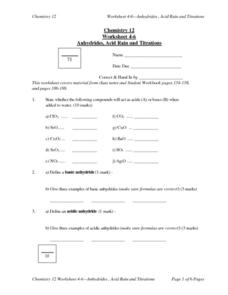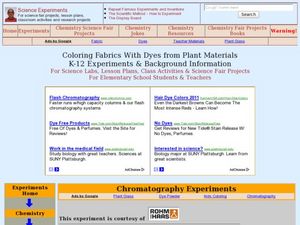Curated OER
Oxidation: How Can It Be Proved?
Students explore the process of oxidation. In this lesson plan about oxidation, students observe four different demonstrations. Students watch examples of oxidation in order to understand the process. Students discuss the chemical...
Curated OER
Introductory Lesson on How pH Levels are Determined
Students explore pH levels of different substances. In this lesson about pH, students work together in three to four groups to test substances. moving between three different stations performing tests on the substances to determine...
Curated OER
The Mole as a Large Number or an Exercise in Dimensional Analysis
Students complete an activity and make "provable estimates." In this dimensional analysis activity students use dimensional analysis and complete an activity.
Curated OER
Anhydrides, Acid Rain and Titrations
In this chemical compounds worksheet, students determine is compounds will act as acids or bases when added to water. Students compare basic, acidic, and amphoteric anhydrides. This worksheet has 15 fill in the blank, 2 short answer...
Curated OER
What is Everything Made of?
Students observe a demonstration on how we see space between water molecules. In this experimental lesson plan students discover what elements make up the things around them and discuss what they learned.
Curated OER
WS 8.9 Presentation Questions
In this mixtures worksheet, students answer twenty three questions about student presentations on topics such as amalgams, homogenized milk, antifreeze and coolants, soaps and detergents and water softeners.
Curated OER
Seltzer Breath
High schoolers investigate "indicator" (Bromothymol Blue or BTB) to test for the presence of certain chemicals in liquids and gases. They compare distilled water and seltzer water for presence of carbon dioxide.
Curated OER
Light & Crystals
Students observe a demonstration of light refraction. They experiment with disappearing crystals to further study light refraction.
Curated OER
Root, Root, Root for the Nutrients
Students observe the growth of a seed, predict what will happen when seeds are planted without soil, and conduct an experiment using a hydroponics system.
Curated OER
What Is In The Cup?
Students investigate the mixtures of solutions. They utilize cups filled with bases and acids. Students test and determine the pH of each cup. The multiple cups are compared to each other in order to chart acids and bases according to pH...
Curated OER
Polymerization Experiments
Students study the concepts of polymerization and the function of crosslinkage. In this polymer lesson plan students complete a lab activity and write down their observations.
Curated OER
Coloring Fabrics With Dyes from Plant Materials K-12 Experiments & Background Information
Students investigate the effects of acid and bases on dyes made with plant materials. In this chromatography lesson students predict color outcomes and complete a lab activity on color combinations.
Curated OER
Crystal Growing
Young scholars explore the different phases of a crystal. In this mineral instructional activity students grow their own sugar crystals using a sugar recipe.
Curated OER
Invisible Ink
Students wxplore acids and indicators by watching a demostration in which "magic" ink appears. They duplicate the demonstration by writing magic messages using phenolphthalein solution and painting the message with vinegar to show it.
Curated OER
Corrosion & Rust
Students examine how and when rust and corrosion occur. In this corrosion lesson students complete an experiment to see why metals rust.
Curated OER
Acid-Base Indicator Paper
Middle schoolers are able to prepare and use pH indicators in paper form. They find out the color of the indicator paper plus test solution may change with time. Students use red cabbage to use for the indicator.
Curated OER
The Synthesis of Some Organic Compounds And Their Representative Structures
Students examine how to represent organic compounds three-dimensionally. They write a synthesis reaction for three demonstrations, and construct a three-dimensional structure using a molecular modeling set.
Curated OER
Thermoset Polymers
Students complete a lab activity with polymers to allow them to better understand how to make "observations". In this science lesson students make measurements and collect data.
Forest Foundation
Forests, Carbon & Our Climate
To conclude their examination of forest ecosystems, class members consider the role forests play in the carbon cycle and how forests can offset climate change.
Cornell University
Predicting Chemical Reactions
Prove the Law of Conservation of Mass through a lab investigation. A well-designed instructional activity asks groups to combine materials and monitor indicators for chemical reactions. Measuring the mass of the reactants and products...
Curated OER
Pollution or Prevention?
Students examine potential contamination on the environment due to products and by-products of a new industrial process. Students conduct a lab that explores the economic differences between choices of pollution cleanup and prevention.
Curated OER
Thin-layer chromatography
Learners produce chromatograms of various vegetable extracts and standards. Using a flat bed scanner, they create a database of the results.
Curated OER
Freshwater Macroinvertebrates
Students identify and count Macroinvertebrates at a Hydrology website. For this macroinvertebrates lesson students collect, sort and identify Macroinvertebrates.
Curated OER
Air, Air Everywhere! Lesson 2: Acid Rain
Middle school environmentalists record the pH of four different liquids, including two aerosol cleaning products. They liken the products to acid rain and speculate in writing which might affect the human respiratory system. Although...

























